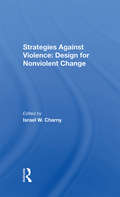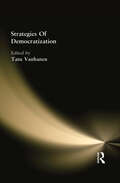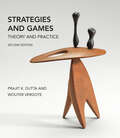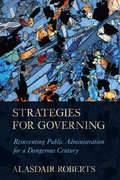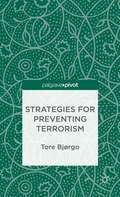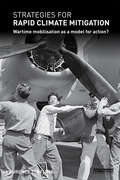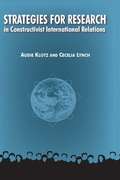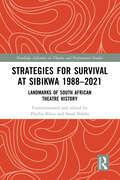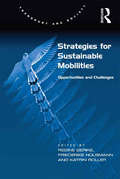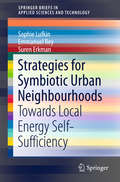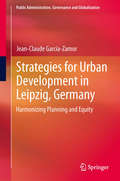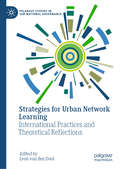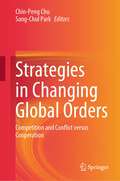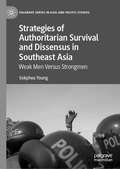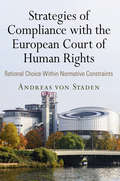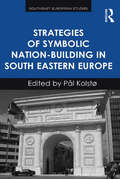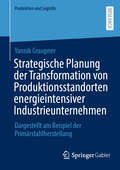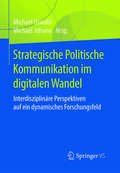- Table View
- List View
Strategies Against Violence: Design For Nonviolent Change
by Israel W. Charny"What would you do to advance the cause of peace in this mad world?" An outstanding group of professionals in psychology, psychiatry, sociology, political science, law, education, journalism, philosophy, and the arts answer this question, working with the concepts and tools of their fields to build a plan or model for behaviours that are likely to advance man toward peace and nonviolent change. They provide a rich sampling of the new ideas for human life that are needed if we are, in fact, ever to evolve into a more peaceful species. The book grew out of a series of sessions organized and chaired by Israel Charny at the annual meetings of the American Ortho-psychiatric Association and the American Association for the Advancement of Science. The contributions are organized around three themes: the person, the community and the culture, and the world. Topics include a model for nonviolent strength to counter aggression by others; an examination of the psychology of Adolph Eichmann, with some startling conclusions about how men should cultivate their normal aggressive emotions and enjoy fantasies of violence; how the American democratic process can be turned unknowingly toward disastrous collective violence; and the problem of reducing the contagion of violence spread by daily newscasts of violent events.
Strategies Of Democratization
by Tatu VanhanenFirst Published in 1992. Routledge is an imprint of Taylor & Francis, an informa company.
Strategies and Games, second edition: Theory and Practice
by Prajit K. Dutta Wouter VergoteThe new edition of a widely used introduction to game theory and its applications, with a focus on economics, business, and politics.This widely used introduction to game theory is rigorous but accessible, unique in its balance between the theoretical and the practical, with examples and applications following almost every theory-driven chapter. In recent years, game theory has become an important methodological tool for all fields of social sciences, biology and computer science. This second edition of Strategies and Games not only takes into account new game theoretical concepts and applications such as bargaining and matching, it also provides an array of chapters on game theory applied to the political arena. New examples, case studies, and applications relevant to a wide range of behavioral disciplines are now included. The authors map out alternate pathways through the book for instructors in economics, business, and political science. The book contains four parts: strategic form games, extensive form games, asymmetric information games, and cooperative games and matching. Theoretical topics include dominance solutions, Nash equilibrium, Condorcet paradox, backward induction, subgame perfection, repeated and dynamic games, Bayes-Nash equilibrium, mechanism design, auction theory, signaling, the Shapley value, and stable matchings. Applications and case studies include OPEC, voting, poison pills, Treasury auctions, trade agreements, pork-barrel spending, climate change, bargaining and audience costs, markets for lemons, and school choice. Each chapter includes concept checks and tallies end-of-chapter problems. An appendix offers a thorough discussion of single-agent decision theory, which underpins game theory.
Strategies and Technologies for Greenhouse Gas Mitigation: An Indo-German Contribution to Global Efforts (Routledge Revivals)
by Jürgen-Friedrich Hake Narendra Bansal Manfred KleemannFirst published in 1999, this volume provide a useful contribution to global CO2 mitigation in an effort towards effective climate protection achieved through national and international efforts. This volume forms part of an international monograph publishing series covering new research into the ‘green’ issues such as government, corporate and public responses to environmental hazards, the economics of green policies and the effectiveness of environmental protection programmes.
Strategies for Disrupting Illegal Firearm Markets: A Case Study of Los Angeles
by Anthony A. Braga Greg Ridgeway George Tita Garen Wintemute Glenn L. PierceCould a data-driven, problem-solving approach yield new interventions to disrupt local, illegal gun markets serving criminals, gang members, and juveniles in Los Angeles? Law enforcement can analyze patterns in crime-gun data to trace illicit firearm acquisition, use community-based interventions to stem the illegal flow, and use retail ammunition-purchase records in identifying prohibited firearm possessors.
Strategies for Fiscal Consolidation in the Post-Crisis World
by Stephanie Eble Cemile Sancak Mauricio Villafuerte Olivier Basdevant Ricardo Velloso S.M. Ali Abbas Greetje Everaert Jan Gottschalk Fuad Hasanov Junhyung ParkIn response To The global financial crisis, governments provided substantial support To The financial and other key sectors. Although this cushioned the adverse effects of the crisis, it is necessary now to articulate a strategy to ensure the sustainability of public finances. This paper discusses the scale and composition of fiscal adjustment that will need to occur once the recovery is securely under way. Although specific country-level circumstances will influence the composition of the adjustment and its political feasibility, In many cases restoring fiscal sustainability will require reforms to reduce spending and increase tax revenue.
Strategies for Governing: Reinventing Public Administration for a Dangerous Century
by Alasdair RobertsWith the fields of public administration and public management suffering a crisis of relevance, Alasdair Roberts offers a provocative assessment of their shortfalls. The two fields, he finds, no longer address urgent questions of governance in a turbulent and dangerous world. Strategies for Governing offers a new path forward for research, teaching, and practice. Leaders of states, Roberts writes, are constantly reinventing strategies for governing. Experts in public administration must give advice on the design as well as execution of strategies that effective, robust, and principled. Strategies for Governing challenges us to reinvigorate public administration and public management, preparing the fields for the challenges of the twenty-first century.
Strategies for Preventing Terrorism
by Tore BjørgoThis innovative new book aims to put society's fight against terrorism into a comprehensive crime prevention perspective with a clear, understandable theoretical foundation, developing a general model for the prevention of crime which is, in this book, applied to terrorism.
Strategies for Rapid Climate Mitigation: Wartime mobilisation as a model for action? (Routledge Advances in Climate Change Research)
by Laurence L DelinaTo keep the global average temperature from rising further than 2°C, emissions must peak soon and then fall steeply. This book examines how such rapid mitigation can proceed – in the scale and speed required for effective climate action – using an analogy provided by the mobilisation for a war that encompassed nations, the Second World War. Strategies for Rapid Climate Mitigation examines the wartime-climate analogy by drawing lessons from wartime mobilisations to develop contingency plans for a scenario where governments implement stringent mitigation programs as an ‘insurance policy’ where we pay for future benefits. Readers are provided a picture of how these programs could look, how they would work, what could trigger them, and the challenges in execution. The book analyses in detail one plausible approach to a crucial issue – an approach built upon knowledge of climate science and on proven and demonstrated mitigation measures. The book is meshed with a social and political analysis that draws upon narratives of mobilisations during the war to meet a transnational threat, while also addressing the shortcomings of the analogy and its strategies. The book will be of great interest to scholars, students, and practitioners of public policy, climate policy, energy policy, international relations, and strategic studies.
Strategies for Research in Constructivist International Relations (International Relations In A Constructed World Ser.)
by Audie Klotz Cecelia M. LynchConstructivism's basic premise - that individuals and groups are shaped by their world but can also change it - may seem intuitively true. Yet this process-oriented approach can be more difficult to apply than structural or rational choice frameworks. Based on their own experiences and exemplars from the IR literature, well-known authors Audie Klotz and Cecelia Lynch lay out concepts and tools for anyone seeking to apply the constructivist approach in research. Written in jargon-free prose and relevant across the social sciences, this book is essential for anyone trying to sort out appropriate methods for empirical research.
Strategies for Survival at SIBIKWA 1988 – 2021: Landmarks of South African Theatre History (Routledge Advances in Theatre & Performance Studies)
by Phyllis Klotz Smal NdabaThis book provides an engaging and contextualised insight into a South African township-based arts centre that has survived the vicissitudes of steady militarisation in townships during some of the worst years of apartheid as well as the exhilaration of a new democratic policy while attempting to circumnavigate different policies and funding dispensations. Sibikwa provides arts centres across the world and especially those in decolonising countries with strategies for survival in tumultuous times. This multi-disciplinary book maps and co-ordinates wider historical, political, and social contextual concerns and events with matters specific to a community-based east of Johannesburg and provides an exploration and analysis by experts of authentic theatre-making and performance, dance, indigenous music, arts in education and NGO governance. It has contemporary significance and raises important questions regarding inclusivity and transformation, the function and future of arts centres, community-based applied arts practices, creativity, and international partnerships. This study will be of great interest to students and scholars in theatre and performance, indigenous music, dance, and South African history.
Strategies for Sustainable Mobilities: Opportunities and Challenges (Transport And Society Ser.)
by Friederike HülsmannSustainable mobility is a qualitative, vague and normative vision. Although this vagueness is often criticized and seen as a drawback it also allows diverse stakeholders to commit to the goal of sustainable mobility. It allows for consensus, which can also help achieve a transport system that enables mobility for current and future generations. The goal of sustainable mobility is an ambitious one and requires a long-term and process-oriented perspective. With this in mind, this volume examines sustainable mobilities from multiple angles varying by time, region, cultural and economic backgrounds, local stakeholders and governance structures. By achieving a better understanding of mobility behaviour and mobility needs in different contexts this book develops innovative strategies and advances modelling approaches which evaluate these strategies. Presented here is not an ideal package of strategies to achieve sustainable mobility but rather innovations in the different disciplines and fields to show how each of them can contribute to keeping all people mobile - today and in the future.
Strategies for Symbiotic Urban Neighbourhoods
by Sophie Lufkin Emmanuel Rey Suren ErkmanUtilizing the results of a case study on the Gare-Lac sector in the city of Yverdon-les-Bains - the site is currently a large urban brownfield, intended to host ca. 3,800 additional inhabitants and 1,200 jobs upon completion - this work examines how to design attractive urban neighbourhoods that generate endogenous economic activity and foster socio-cultural dynamics, while moving towards local energy self-sufficiency. Exploring the different dimensions influencing energy self-sufficiency at the neighbourhood scale by integrating parameters related to buildings, infrastructure, mobility, food, goods and services, the work focuses on three scenarios (technological, behavioural and symbiotic) for the future development of this neighbourhood through 2035. The scenarios test different design strategies related to industrial symbioses, production, storage, transportation, and urban agriculture.
Strategies for Urban Development in Leipzig, Germany
by Jean-Claude Garcia-ZamorThe demographic pressure caused by migration offers a considerable challenge for urban centers today. It results in an uneven development of the community and focus of urban planners becomes how to provide decent, low-cost housing and transportation in order to facilitate the integration of poorer residents among the rest of the community. In large industrialized countries the challenges of urban policy-makers are made even more complicated since these governments depend on state or federal legislators to obtain the massive amounts of funding required for adequately addressing these local issues that are in global cause. The book analyzes the strategies for urban development in Leipzig, Germany, and shows how civic leaders were able to harmonize planning and equity. They relied heavily on two interesting approaches in that process: the promotion of culture as a key component of urban development and the reconciliation of the inevitable process of gentrification with social equity. The book also looks at the globalization aspect of urban development, reviews research in social equity in urban development in Europe and the United States and describes sustainability as an important element of urban renaissance.
Strategies for Urban Network Learning: International Practices and Theoretical Reflections (Palgrave Studies in Sub-National Governance)
by Leon van den DoolThis book presents international experiences in urban network learning. It is vital for cities to learn as it is necessary to constantly adapt and improve public performance and address complex challenges in a constantly changing environment. It is therefore highly relevant to gain more insight into how cities can learn. Cities address problems and challenges in networks of co-operation between existing and new actors, such as state actors, market players and civil society. This book presents various learning environments and methods for urban network learning, and aims to learn from experiences across the globe. How does learning take place in these urban networks? What factors and situations help or hinder these learning practices? Can we move from intuition to a strategy to improve urban network learning?
Strategies for Work with Involuntary Clients
by Ronald H. Rooney Rebecca MirickOften in their careers, social workers will encounter clients who are either legally required to attend treatment services or are otherwise coerced or pressured into those services. Practitioners in settings from prisons to emergency rooms to nursing homes to child protection agencies will find themselves with involuntary clients. In an update to this classic text, social workers Ronald H. Rooney and Rebecca G. Mirick explore the best ways to work with unwilling clients.While work with involuntary clients is common, it can be challenging, frustrating, and unproductive unless practitioners are well trained for it. This book provides a theoretical framework for understanding the legal, ethical, and practical concerns when working with involuntary clients, offering theory, treatment models, and specific practice strategies influenced by the best available knowledge. Animated by case studies across diverse settings, these resources can be used by practitioners to facilitate collaborative, effective working relationships with involuntary clients.
Strategies in Changing Global Orders: Competition and Conflict versus Cooperation
by Chin-Peng Chu Sang-Chul ParkThis book explores the intricate web of economic diplomacy, Asia Pacific strategies, and Mega Free Trade Agreements (FTAs) that shape the region's dynamics. It also examines the European Union's perspective, considering its shared interests with East Asia and the USA. Avoiding military conflicts in sensitive regions such as the Taiwan Straits and the Korean Peninsula is crucial, as the economic ramifications of any such conflicts could be catastrophic on a global scale, fundamentally altering the course of the New Cold War.Divided into four parts, the book begins with an introduction, setting the stage for the ensuing exploration. Part two delves into economic diplomacy, Asia Pacific strategies, and Mega FTAs in East Asia, while part three examines the same themes in the context of the European Union. Finally, part four concludes with insightful remarks that tie together the findings from the preceding sections.As the world teeters on the precipice of a new era defined by global power struggles and geopolitical realignments, this book offers a comprehensive analysis of the pressing issues facing East Asia and the EU. It challenges readers to reflect on history's lessons and find wise solutions through theoretical and practical approaches.
Strategies of Authoritarian Survival and Dissensus in Southeast Asia: Weak Men Versus Strongmen (Palgrave Series in Asia and Pacific Studies)
by Sokphea YoungThis book analyses how authoritarian rulers of Southeast Asian countries maintain their durability in office, and, in this context, explains why some movements of civil society organizations succeed while others fail to achieve their demands. It discusses the relationship between the state-society-business in the political survival context. As the first comparative analysis of strategies of regime survival across Southeast Asia, this book also provides an in-depth insight into the various opposition movements, and the behaviour of antagonistic civic and political actors in the region.
Strategies of Compliance with the European Court of Human Rights: Rational Choice Within Normative Constraints (Pennsylvania Studies in Human Rights)
by Andreas Von StadenIn Strategies of Compliance with the European Court of Human Rights, Andreas von Staden looks at the nature of human rights challenges in two enduring liberal democracies—Germany and the United Kingdom. <P><P>Employing an ambitious data set that covers the compliance status of all European Court of Human Rights judgments rendered until 2015, von Staden presents a cross-national overview of compliance that illustrates a strong correlation between the quality of a country's democracy and the rate at which judgments have met compliance. Tracing the impact of violations in Germany and the United Kingdom specifically, he details how governments, legislators, and domestic judges responded to the court's demands for either financial compensation or changes to laws, policies, and practices. <P><P>Framing his analysis in the context of the long-standing international relations debate between rationalists who argue that actions are dictated by an actor's preferences and cost-benefit calculations, and constructivists, who emphasize the influence of norms on behavior, von Staden argues that the question of whether to comply with a judgment needs to be analyzed separately from the question of how to comply. <P><P>According to von Staden, constructivist reasoning best explains why Germany and the United Kingdom are motivated to comply with the European Court of Human Rights judgments, while rationalist reasoning in most cases accounts for how these countries bring their laws, policies, and practices into sufficient compliance for their cases to be closed. <P><P>When complying with adverse decisions while also exploiting all available options to minimize their domestic impact, liberal democracies are thus both norm-abiding and rational-instrumentalist at the same time—in other words, they choose their compliance strategies rationally within the normative constraint of having to comply with the Court's judgments.
Strategies of Containment: A Critical Appraisal of American National Security Policy During the Cold War (Revised and Expanded Edition)
by John Lewis GaddisWhen Strategies of Containment was first published, the Soviet Union was still a superpower, Ronald Reagan was president of the United States, and the Berlin Wall was still standing. This updated edition of Gaddis' classic carries the history of containment through the end of the Cold War. Beginning with Franklin D. Roosevelt's postwar plans, Gaddis provides a thorough critical analysis of George F. Kennan's original strategy of containment, NSC-68, The Eisenhower-Dulles "New Look," the Kennedy-Johnson "flexible response" strategy, the Nixon-Kissinger strategy of detente, and now a comprehensive assessment of how Reagan-- and Gorbachev-- completed the process of containment, thereby bringing the Cold War to an end. He concludes, provocatively, that Reagan more effectively than any other Cold War president drew upon the strengths of both approaches while avoiding their weaknesses. A must-read for anyone interested in Cold War history, grand strategy, and the origins of the post-Cold War world.
Strategies of Symbolic Nation-building in South Eastern Europe
by Pål KolstøAfter the conflagration of Tito’s Yugoslavia a medley of new and not-so-new states rose from the ashes. Some of the Yugoslav successor states have joined, or are about to enter, the European Union, while others are still struggling to define their national borders, symbols, and relationships with neighbouring states. Strategies of Symbolic Nation-building in South Eastern Europe expands upon the existing body of nationalism studies and explores how successful these nation-building strategies have been in the last two decades. Relying on new quantitative research results, the contributors offer interdisciplinary analyses of symbolic nation-building in Albania, Bosnia-Herzegovina, Croatia, Kosovo, Macedonia, Montenegro, and Serbia to show that whereas the citizens of some states have reached a consensus about the nation-building project other states remain fragmented and uncertain of when the process will end. A must-read not only for scholars of the region but policy makers and others interested in understanding the complex interplay of history, symbolic politics, and post-conflict transition.
Strategies to Achieve a Binding International Agreement on Regulating Cartels
by John Sanghyun LeeThis book addresses the lack of binding multi-lateral international agreement on cartels, through analysis of trials and failures. It also suggests strategic approaches to overcome current standstills. In addition, the book contrasts international agreement on cartels with inter-governmental commodity agreement which has been developed separately through international law. Through this project, the author puts forth that successful international law on cartels needs to reflect the interests and arguments of developing countries.
Strategische Interaktion in der Haushaltspolitik: Advokaten, Kassenwarte und Regierungschefs in parlamentarischen Systemen
by Bernd LuigIn parlamentarischen Regierungssystemen stehen bei haushaltspolitischen Konflikten auf der einen Seite die Ausgabenminister. In ihren Geschäftsbereichen spielen die Ausgaben eine merklich größere Rolle als die Einnahmen. Sie besitzen daher unabhängig vom Umweltzustand ihrer Geschäftsbereiche den Anreiz, stets ein größeres Budget einzufordern. Ihnen gegenüber stehen mit einem politikbereichsübergreifenden Interesse der Finanzminister und der Regierungschef. Während der Finanzminister üblicherweise der Rationalität des Haushaltsausgleichs folgt, orientiert sich aber letzterer vermutlich am Erfolg der gesamten Regierungsarbeit. In diesem Buch wird nunmehr das Handeln von jedem Ausgabenminister, des als Kassenwart erscheinenden Finanzministers und des Regierungschefs modelliert. Im Mittelpunkt der Arbeit steht dabei die Forschungsfrage, inwieweit die Interaktion der drei Akteure die bereichsspezifischen Ausgaben in den Budgets der deutschen Länder beeinflusst.
Strategische Planung der Transformation von Produktionsstandorten energieintensiver Industrieunternehmen: Dargestellt am Beispiel der Primärstahlherstellung (Produktion und Logistik)
by Yannik GraupnerYannik Graupner untersucht Fragestellungen zur Transformation energieintensiver Industrieunternehmen. Hierzu entwickelt er ein neuartiges Entscheidungsunterstützungswerkzeug zur Bewertung und Gestaltung von Transformationspfaden einzelner Produktionsstandorte. Dieses basiert auf einer Investitions- und Kostenrechnung sowie einer Ökobilanzierung, die auf einer aktivitätsanalytischen Modellierung von Produktionsprozessen aufbauen. Zur Gestaltung der Transformation, auch unter Berücksichtigung der Mechanismen des Europäischen Emissionshandels, entwickelt er ein mathematisches Optimierungsmodell. Durch Anwendung des Entscheidungsunterstützungswerkzeugs innerhalb einer Fallstudie aus der Stahlindustrie werden Erkenntnisse hinsichtlich der Auswirkungen alternativer Produktionsverfahren sowie des Einflusses externer Rahmenbedingungen auf die Transformation gewonnen. Auf Basis dessen leitet er Handlungsempfehlungen für die Stahlindustrie und Politik ab.
Strategische Politische Kommunikation im digitalen Wandel: Interdisziplinäre Perspektiven Auf Ein Dynamisches Forschungsfeld
by Michael Oswald Michael JohannDie Digitalisierung hat in den vergangenen Jahren sowohl die Kommunikationsroutinen als auch die Agenden von politischen Akteuren nachhaltig verändert. Einerseits hat der Medienwandel neue Möglichkeiten zur politischen Partizipation und Interaktion hervorgebracht. Andererseits werden digitale Phänomene wie Fake News oder Hassrede von politischen Akteuren instrumentalisiert, um strategische Ziele durchzusetzen. Inwieweit die sozialen Medien dabei zu Echokammern der Nutzer werden, ist umstritten. An einem scheinbaren Siedepunkt der Debatte zum Medienwandel gibt dieser Sammelband einen Überblick über die Auswirkungen der Digitalisierung auf die strategische Politische Kommunikation. Anhand aktueller Untersuchungen werden dabei politik- und kommunikationswissenschaftliche Perspektiven zu einer interdisziplinären Bestandsaufnahme zusammengeführt. Der Inhalt• Kommunikationsstrukturen im Wandel• Social-Media-Kommunikation im US-Wahlkampf 2016• Digitale Strategien politischer Akteure• Kommunikations- und Kampagnenmanagement• Politische Partizipation online und offlineDie Zielgruppen• Politik- und Kommunikationswissenschaftler• Politik-Journalisten• Politikberater und -strategen• Politische AkteureDie HerausgeberDr. Michael Oswald ist Akademischer Rat am Lehrstuhl für Politikwissenschaft an der Universität Passau, Associate Research Fellow und Lehrbeauftragter am John F. Kennedy Institut, Faculty-Member bei CIFE (Int. Zentrum für europäische Bildung) und bei Nautilus Politikberatung.Michael Johann ist wissenschaftlicher Mitarbeiter am Lehrstuhl für Computervermittelte Kommunikation an der Universität Passau.
